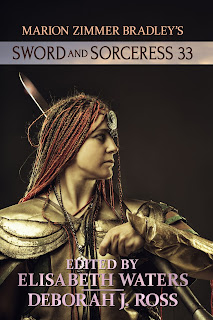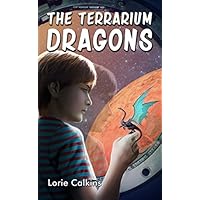Enter a wondrous universe…the latest volume of Sword and Sorceress, featuring stories
from new and seasoned authors. Herein you will find tales of fantasy with
strong female characters, with some version of either martial skill or magic.
Not all the protagonists will be human, and sometimes the magic will take
highly original forms, but the emotional satisfaction in each story and in the
anthology as a whole, remains true to the original vision. The release date will
be November 2, 2018.
Kindle: https://amzn.to/2NitlHH
Deborah J. Ross: Tell us a little about yourself. How did you come
to be a writer?
Lorie Calkins: I’ve been writing since I was about
three. I would scribble in a blank notebook, trying to make lines that looked
like my parents’ handwriting.Then I’d “read” it back and tell my stuffed
animals what the “story” said. Sure wish I had recorded those tales in a more
reproducible manner. My stuffed animals thought they were Really Good.
The writing comes pretty easily for me, actually. The two things
that are absolute hell for me are determining whether the stuff I wrote is
worth showing to anyone,and trying to sell it.
DJR: What authors have most influenced your writing? What about
them do you find inspiring?
DJR: Why do you write what you do, and how does your work differ
from others in your genre?
LC: I like to write fantasy or science
fiction, because I can make the characters think and do what I say. Not that
they don’t take over and do things that surprise me, but the things they do are
likely to be something I can make sense of, becauseI put together their cogs
and timing chains.I find real life baffling, and don’t always know where people
are coming from, so it’s easier if I can make up the world to work the way I
want it to.
DJR: What advice would you give an aspiring writer?
LC: The world of writing and publishing
contains many kind and helpful people who are eager to help newbies and pay
forward the help they received. It also harbors vast numbers of people who only
see suckers and want to take advantage. I’ve found it hard to tell the
difference sometimes, and paid the price. I would tell a wannabe, “Bah. Go to
school. Learn something useful.” Or maybe, “Here’s a hammer. Hit yourself with
it repeatedly, and it will feel the same as the road to getting published.” If
they are among those who have to write, can’t stay away from writing, and are
prepared to suffer the consequences, I would tell them to try the traditional
route first, sending to established publishers, because
it’s a good way to find out if the work is really ready for publication.
Lorie Calkins’s first pro short story sale,
“Oops,” was to Marion Zimmer Bradley’s
Fantasy Magazine in 1994, for issue #30.Her stories are also in Sword and Sorceress anthologies 19, 28,
31, and 32, as well as many short stories in various magazines, and a science
fiction book for children, The Terrarium
Dragons. Besides the medium of words, Lorie likes making things in wood,
fabric, glass, yarn, or metal, but above all, she enjoys spending time with her
grandchildren.
Lorie and her husband live with Magic and
Chaos, two Miniature Schnauzers who fully live up to their names. Their home is
on Whidbey Island in Washington State.


No comments:
Post a Comment